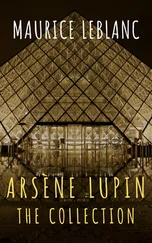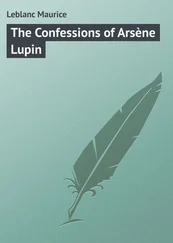Maurice Leblanc - The Frontier
Здесь есть возможность читать онлайн «Maurice Leblanc - The Frontier» — ознакомительный отрывок электронной книги совершенно бесплатно, а после прочтения отрывка купить полную версию. В некоторых случаях можно слушать аудио, скачать через торрент в формате fb2 и присутствует краткое содержание. Жанр: Классический детектив, foreign_detective, foreign_prose, на английском языке. Описание произведения, (предисловие) а так же отзывы посетителей доступны на портале библиотеки ЛибКат.
- Название:The Frontier
- Автор:
- Жанр:
- Год:неизвестен
- ISBN:нет данных
- Рейтинг книги:4 / 5. Голосов: 1
-
Избранное:Добавить в избранное
- Отзывы:
-
Ваша оценка:
- 80
- 1
- 2
- 3
- 4
- 5
The Frontier: краткое содержание, описание и аннотация
Предлагаем к чтению аннотацию, описание, краткое содержание или предисловие (зависит от того, что написал сам автор книги «The Frontier»). Если вы не нашли необходимую информацию о книге — напишите в комментариях, мы постараемся отыскать её.
The Frontier — читать онлайн ознакомительный отрывок
Ниже представлен текст книги, разбитый по страницам. Система сохранения места последней прочитанной страницы, позволяет с удобством читать онлайн бесплатно книгу «The Frontier», без необходимости каждый раз заново искать на чём Вы остановились. Поставьте закладку, и сможете в любой момент перейти на страницу, на которой закончили чтение.
Интервал:
Закладка:
Philippe remembered. He was to have gone to the Old Mill last year; and the letter must have been sent to him by one of his friends.
"And haven't you tried to find out?"
"What for? Because I have a scoundrel in my family, that's no reason why I should be in a hurry to make his acquaintance! Besides, he himself has had the decency not to put his name to his scurrilous nonsense… No matter: if ever I lay my hands on him!.. But don't let's talk of it…"
He continued to talk of it, nevertheless, and at great length, as well as of all the questions of war and peace, history and politics that came to his mind. It was not until he had "got his budget off his chest," as he said, that he exclaimed, suddenly:
"Enough of this palavering, my friends! Why, it's four o'clock! Saboureux, I'm your man… So they've been making free with your poultry, have they? Are you coming, Jorancé? We'll see some fine soldier-chaps making their soup. There's nothing jollier and livelier than a French camp!"
CHAPTER IV
PHILIPPE AND HIS WIFE
Marthe and Suzanne were very intimate, in spite of the difference in their ages. Marthe was full of indulgent kindness for her friend, whom she had known as quite a child, motherless and left to herself; whereas Suzanne was less even-tempered with Marthe, now gushing and coaxing, now aggressive and satirical, but always full of charm.
When Marthe had finished unfastening the trunks, Suzanne herself insisted on emptying the travelling-bag and arranging on the table all the little things with which one tries, when away, to give one's room a look of home: portraits of the children, writing-cases, favourite books…
"You'll be very snug here, Marthe," she said. "It's a nice, light room … and there's only a dressing-room between you and Philippe… But how did you come to want two bedrooms?"
"It was Philippe. He was afraid of disturbing me in the mornings…"
"Oh," repeated the girl. "It was Philippe's suggestion…"
Then she took up one of the photographs and examined it:
"How like his father your son Jacques is!.. Much more so than Paul … don't you think?"
Marthe came to the table and, bending over her friend, looked at the picture with those mother's eyes which seem to see in the inanimate image the life, the smile and the beauty of the absent one.
"Which do you like best, Jacques or Paul?" asked Suzanne.
"What a question! If you were a mother…"
"If I were a mother, I should like that one best who reminded me most of my husband. The other would make me suspect that my husband had ceased to love me…"
"You put down everything to love, my poor Suzanne! Do you imagine that there is nothing in the world but love?"
"There are heaps of other things. But you yourself, Marthe: wouldn't you like love to fill a greater place in your life?"
This was said with a certain sarcasm, of which Marthe felt the sting. But, before she had time to retort, Philippe appeared in the doorway.
Suzanne at once cried:
"We were talking about you, Philippe."
He made no reply. He went to the window, closed it and then came back to the two young women. Suzanne pointed to a chair beside her, but he sat down by Marthe; and Marthe saw by his look that something had happened:
"Have you spoken to him?"
"No."
"Still …"
He told her, in a few sentences, of the conversation, with the incident of the pamphlet and the words which his father had spoken against the author of that work. He repeated the words, a second time, with increasing bitterness. Then he stopped, reflected and, pressing his clenched fists to his temples, said, slowly, as though he were explaining matters to himself:
"It's three years now that this has lasted … ever since his letter on my appointment, in which he wrote about my second book on the idea of country. Perhaps I ought to have written to him then and there and told him of the evolution of my mind and the tremendous change which the study of history and of vanished civilizations had wrought in me."
"Perhaps it would have been better," said Marthe.
"I was afraid to. I was afraid of hurting him… It would have hurt him so terribly!.. And my love for him is so great!.. And then, Marthe, you see, the ideas which he defends and of which, in my eyes, he is the living and splendid incarnation are so beautiful in themselves that, after one has ceased to share them, one continues, for a long time, for always, to retain a sort of involuntary affection for them, deep down in one's inner self. They constituted the greatness of our country for centuries. They are vigorous, like everything that is religious and pure. One feels a renegade at losing them; and any word spoken against them sounds like blasphemy. How could I say to my father, 'Those ideas, which you gave me and which were the life of my youth, I have ceased to hold. Yes, I have ceased to think as you do. My love of humanity does not stop at the boundaries of the country in which I was born; and I do not hate those who are on the other side of the frontier. I am one of those men who will not have war, who will not have it at any price and who would give their life-blood to save the world the horror of that scourge.' How could I say such things as that to my father?"
He rose and, pacing the room, continued:
"I did not say them. I concealed the true state of my mind, as though I were hiding a shameful sore. At the meetings, in the newspapers to which I contribute by stealth, to my adversaries and to the majority of the men on my own side I was M. Philippe, denying my name and my personality, setting a bad example to those who are silent for prudence' sake and for fear of compromising themselves. I do not sign the pamphlets which I write; and the book in which I give the conclusion of my work has been ready for more than a year, without my daring to publish it. Well, that's over now. I can't go on as I have been doing. Silence is choking me. By humbling myself, I lower my ideals. I must speak aloud, in the hearing of all men. I will speak."
He had gradually become animated, excited by his own words. His voice had increased in volume. His face expressed the glowing, irresistible, often blind enthusiasm of those who devote themselves to generous causes. And, yielding to a need to speak out which was anything but frequent with him, he went on:
"You don't know, you don't know what it means to a man to be fired with a great idea … whether it be love of humanity, hatred of war or any other beautiful illusion. It lights us and leads us. It is our pride and our faith. We seem to have a second life, the real life, that belongs to it, and an unknown heart that beats for it alone. And we are prepared to suffer any sacrifice, any pain, any wretchedness, any insult … provided that it gain the day."
Suzanne listened to him with obvious admiration. Marthe appeared uneasy. Knowing Philippe's nature thoroughly, she was well aware that, in thus letting himself go, he was not only being carried away by a flood of eloquent words.
He opened the window and drew a deep breath of the pure air which he loved. Then he returned and added:
"We are even prepared to sacrifice those around us."
Marthe felt all the importance which he attached to this little sentence; and, after a moment, she said:
"Are you referring to me?"
"Yes," said Philippe.
"But you know, Philippe, that, when I agreed to marry you, I agreed to share your life, whatever it might be."
"My life as it looked like being, but not as I shall be compelled to make it."
She looked at him with a glimmer of apprehension. For some time now, she had noticed that he was even less communicative than usual, that he hardly ever spoke of his plans and that he no longer told her what he was working at.
Читать дальшеИнтервал:
Закладка:
Похожие книги на «The Frontier»
Представляем Вашему вниманию похожие книги на «The Frontier» списком для выбора. Мы отобрали схожую по названию и смыслу литературу в надежде предоставить читателям больше вариантов отыскать новые, интересные, ещё непрочитанные произведения.
Обсуждение, отзывы о книге «The Frontier» и просто собственные мнения читателей. Оставьте ваши комментарии, напишите, что Вы думаете о произведении, его смысле или главных героях. Укажите что конкретно понравилось, а что нет, и почему Вы так считаете.












